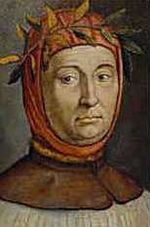 8: "Helicon": — A mountain celebrated because it is the location of two springs sacred to the Muses.
8: "Helicon": — A mountain celebrated because it is the location of two springs sacred to the Muses.
9: "Such desire for laurel, and for myrtle?": — "In ancient Greece [laurel] wreaths were awarded to victors, both in athletic competitions, including the ancient Olympics, and in poetic meets; in Rome they were symbols of martial victory, crowning a successful commander during his triumph" (Laurel wreath). On April 8, 1341 Petrarch was crowned poet laureate, and is therefore most often depicted wearing a laurel wreath. The myrtle was associated with Venus, goddess of love.
10: 'Poor and naked goes philosophy': "Philosophy" here refers to all kinds of advanced knowledge. The phrase 'Poor and naked goes philosophy' is a mockery, along the lines of "If you're so smart, why aren't you rich?"